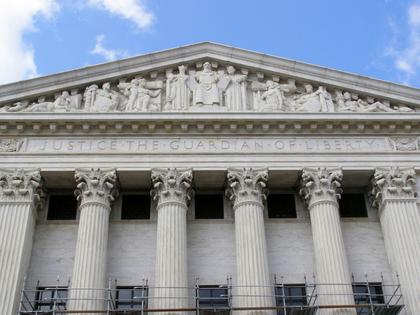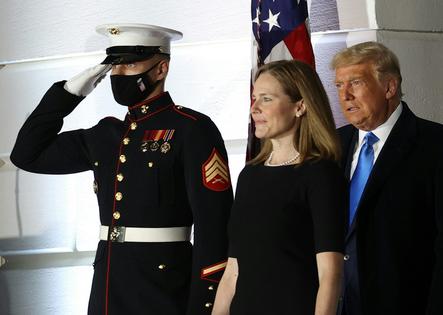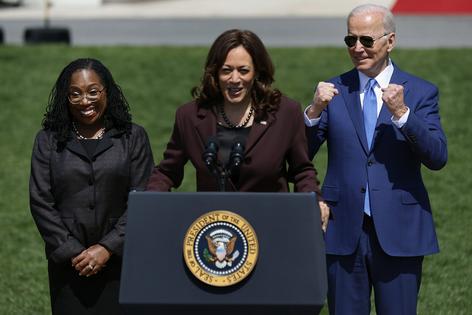What to expect from federal judges appointed by Trump or Harris − based on what we’ve seen from Trump and Biden picks for the Supreme Court and lower courts
Published in Political News
The past eight years have clearly demonstrated that who sits on the federal courts matters.
The country has watched the Supreme Court take a sharp turn to the right on issues such as abortion, the Second Amendment and presidential power.
And the public has lost faith in the Supreme Court, which has an approval rating of 40%, a record low.
The opening of the court’s term on Oct. 7, 2024, provides an opportunity to think about how presidential candidates Donald Trump and Kamala Harris differ with respect to the appointment of judges.
During their terms, the Trump-Pence administration appointed 223 federal district court and court of appeals judges, and the Biden-Harris administration has thus far appointed more than 210 district court and court of appeals judges. Together, this makes up just over half of all judges serving on these courts.
As a leading expert in the selection of federal judges and judicial decision-making, I have thoroughly analyzed both candidates’ records regarding judicial nominations. What emerges is a stark contrast between the two.
The Trump-Pence administration emphasized the selection of very conservative jurists with deep ties to the conservative legal movement. In contrast, the Biden-Harris administration sought to diversify the federal bench, making it more closely reflect the America it represents.
During the 2016 presidential campaign, Trump made two unprecedented moves regarding the appointment of federal judges.
That year, Trump was the first candidate in American history to release a list of his potential Supreme Court picks during the campaign, which he did again in 2020. He has not yet done this in his 2024 election bid.
True to his word, Trump’s three Supreme Court nominees came from these lists, which were assembled and made public to alleviate the concerns of conservatives skeptical of his candidacy.
Second, Trump outsourced the selection of his federal judges to elites in the conservative legal movement, a network of wealthy individuals and organizations devoted to advancing conservative causes in the legal system. Issues central to the movement include restricting access to abortion, limiting business regulation and promoting originalism, a judicial philosophy based on the idea that the Constitution has a fixed meaning.
Elite individuals with ties to the Federalist Society and Heritage Foundation, two of the most powerful organizations in the conservative legal movement, played the foremost roles in selecting Trump’s judicial nominees.
In particular, Leonard Leo, the current co-chairman and former executive vice president of the Federalist Society, which describes itself as placing a “premium on individual liberty, traditional values, and the rule of law,” was primarily responsible for the selection of the judges Trump nominated to the federal bench.
For Trump and the conservative legal movement, this was a winning strategy. With Republicans in control of the Senate during Trump’s presidency, these judges were overwhelmingly confirmed even when they lacked the qualifications expected of a typical federal judge, such as trial court experience.
Once confirmed, Trump’s judicial nominees advanced the conservative agenda through their votes and opinions. The overturning of Roe v. Wade, which was opposed by more than 60% of the public, is clearly demonstrative of this conservative agenda, and there is a broader pattern.
Research shows that judges affiliated with the Federalist Society are substantially more conservative than even their counterparts in the Republican Party who are not associated with the organization.
Since Trump was able to appoint more than 200 federal judges to lifetime terms, including three Supreme Court justices, this means that the conservative turn will last for decades, if not generations.
In short, Trump’s judges are true believers in the mission of the conservative legal movement, and their decision-making reflects this.
The Biden-Harris administration took a different approach to selecting federal judges.
For almost all of the nation’s history, federal judges were chosen from an elite group of white men.
Qualified individuals were kept out of becoming federal judges because of their race, gender, ethnicity, religion, sexual orientation or a combination of these identities. Under Trump, 84% of judges confirmed were white and 76% were men.
This resulted in an American judiciary that looked very different than the mosaic that makes up the country.
This was most obvious in Biden’s 2022 promise to appoint the first Black women to the Supreme Court, which resulted in the nomination of Ketanji Brown Jackson.
It was also demonstrated by the administration’s lower court nominations.
Unlike the Trump-Pence administration, whose federal judicial appointees were overwhelmingly white men, the Biden-Harris administration identified and nominated a diverse group of qualified federal judges. In fact, the federal judiciary under the Biden-Harris administration is the most diverse in terms of race, gender and ethnicity in the nation’s history. Only 38% of judges confirmed under the Biden-Harris administration were white, and only 36% were men.
And racial and gender diversity on the bench matters. Judges admit that their personal experiences can shape how they approach cases, and research confirms this. Scholars have shown that female judges and judges of color are more progressive than other judges, particularly on issues that they have unique experiences with, such as gender and racial discrimination.
For instance, Biden appointee Judge Candace Jackson-Akiwumi is only the second Black women to serve on the 7th U.S. Circuit Court of Appeals. In a 2022 case, she wrote the majority opinion allowing a Black couple to present their claims of racial discrimination relating to housing to a jury. In contrast, Trump appointee Amy Joan St. Eve, a white woman, dissented and downplayed the negative consequences of the racial epithets used against the couple.
And beyond judicial decisions, research also shows that having diverse representation on the courts can lead to an increase in support for courts among women and people of color.
Although it is a bit too early to reach firm conclusions, it appears that the Biden-Harris administration’s judicial appointees are moderate liberals. For instance, thus far Brown Jackson is more moderate than liberal Justices Elena Kagan and Sonia Sotomayor, who were appointed by President Barack Obama.
The Trump-Pence and Biden-Harris administrations took very different approaches to the selection of federal judges.
Trump will be remembered for his ideological approach, working with elites in the conservative legal movement to select very conservative judges. In contrast, the Biden-Harris administration’s legacy will be its focus on diversity, which resulted in the appointment of judges who reflect the many identities of the American public.
This article is republished from The Conversation, a nonprofit, independent news organization bringing you facts and trustworthy analysis to help you make sense of our complex world. It was written by: Paul M. Collins Jr., UMass Amherst
Read more:
Trump pushes the limits of every restriction he faces – including threatening judges and their families
How conservative groups will advance their agendas before a Supreme Court with Amy Coney Barrett
After Roe’s overturning, Americans are demanding Supreme Court term limits
Paul M. Collins Jr. does not work for, consult, own shares in or receive funding from any company or organization that would benefit from this article, and has disclosed no relevant affiliations beyond their academic appointment.


































































Comments